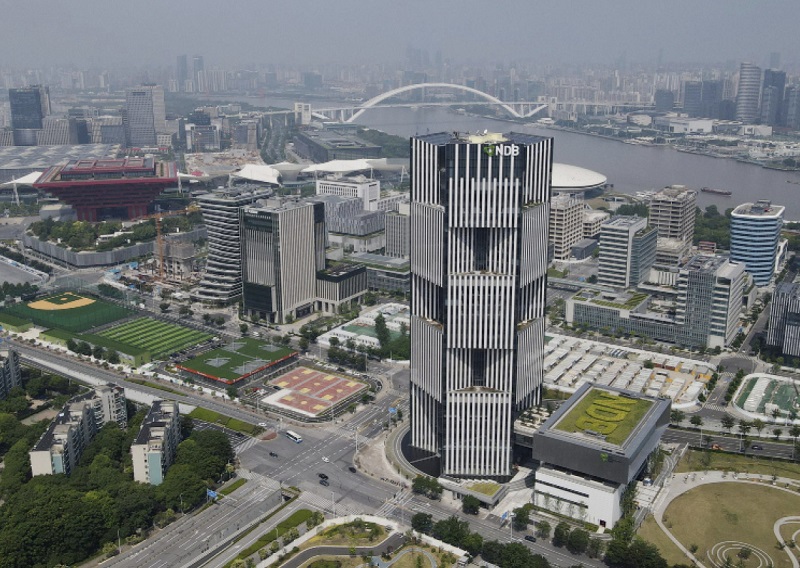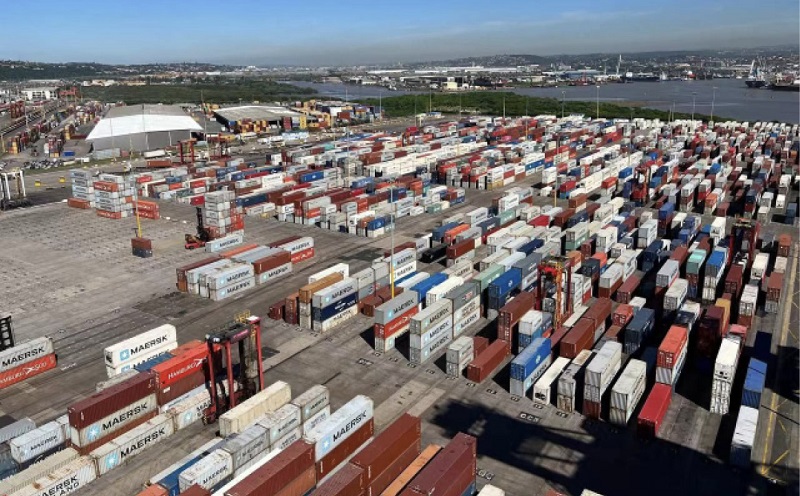Playing a Bridging Role
The 2008 financial crisis changed the course of global economic development. The introduction of quantitative easing monetary policy by major Western economies has caused the dramatic volatility in international financial markets, and the decline in exchange rates have become one of the major external risks to the development of many emerging and developing economies.
More and more emerging countries are realizing that the global economic system dominated by the West can no longer serve the needs of the world’s current development and therefore there is an urgent need to create a new system of economic governance, one that is more equitable, fair, and inclusive.
It is in this context that the BRICS grouping was formed. In July 2014, the five countries officially launched an initiative to establish the New Development Bank (NDB), and in July 2015, the NDB began its operations with headquarters in Shanghai. In less than a decade, this development finance institution with the status of an independent international legal entity for emerging economies has made a number of remarkable achievements, providing important funding to emerging economies in areas such as infrastructure financing, fighting against COVID-19, and green energy development assistance, playing an important role in supporting the development of the BRICS countries, and becoming a new force that cannot be overlooked in the current international financial system.
Both in terms of cooperation among the BRICS countries and the impact on the current global financial system, the NDB is of great practical and strategic importance.

The NDB headquarters in Shanghai’s Pudong New Area on June 17, 2022.
A Practical Mechanism
The NDB is a mechanism that provides a model for implementing and realizing the concept of BRICS cooperation, and deepens pragmatic cooperation among the five BRICS countries in a multidimensional manner. As one of the major achievements of practical cooperation among BRICS countries, the NDB is the first multilateral development bank established and managed by developing and emerging economies with the aim of providing financing for infrastructure construction and sustainable development in the countries concerned. In addition to the BRICS countries, the United Arab Emirates, Uruguay, Bangladesh, and Egypt have also become official members of the bank, while Saudi Arabia, Argentina, Kazakhstan, and Iran have applied for membership or expressed their intention to join. This significant progress in membership development marks the beginning of the NDB’s emergence as a global multilateral development bank. The first regional center established by the NDB, the African Regional Center in Johannesburg, South Africa, has become the Bank’s “window to Africa” and represents an innovative and successful attempt at financial cooperation among developing countries. Since its inception, the NDB has implemented 11 projects in South Africa with total financing of US $5.4 billion. Some of the largest investments have been in areas such as combating COVID-19 pandemic, transport infrastructure construction, clean energy development and energy efficiency improvements.
The NDB complements existing financing mechanisms and addresses the real development needs of emerging economies. Compared to other international multilateral banks, the NDB takes a beneficiary-driven approach by giving equal voting rights to its founding members, providing loans without political strings attached, and emphasizing equality of relationships between the financing and financed countries.
Unlike other international banks that assess beneficiary country conditions against “best international standards,” thereby imposing their own criteria on others, the NDB assesses borrowing countries based on their own national standards and systems, thus applying more flexible and applicable “country-specific criteria” that give beneficiary countries greater autonomy to determine their own development paths according to their own circumstances.
In addition, the NDB offers emerging economies the opportunity to diversify their settlement options and free themselves from the constraints and limitations of existing mechanisms. While traditional multilateral banks offer preferential loans, they are mainly denominated in US dollars, which exposes borrowing countries to the risk of exchange rate fluctuations and prevents them from having full control over their own development plan. This becomes one of the main causes of the developing countries’ debt problem.
The NDB has always prioritized the use of local currencies and has used currencies other than the US dollar for payments, such as the renminbi, rand, and Swiss franc, to increase financial autonomy, reduce currency risk for emerging economies, and mitigate their longstanding dependence on the Western world.
The NDB is a symbol of emerging economies’ transformation as rule-setters and provides an important platform for their active participation in reforming the global financial system. The governance decisions and structures of the World Bank and the International Monetary Fund, traditionally led by the G7, appear outdated and conservative in light of the changes in the current global economic landscape.
The BRICS countries now have a larger GDP than the G7, with the will and ability to make their voices heard on the global economic stage. However, in the current system of global economic governance, the representation and free expression of these countries is often overlooked and marginalized due to the hegemonic position of the West.
The NDB therefore provides an important platform for emerging economies to put forward joint proposals and represent their own interests. As a multilateral development bank jointly supported by emerging economies, the expansion of its scope of activities, the broadening of its investment spectrum, and the strengthening of its influence not only solve the dilemma of collective action by emerging economies in reforming the global economic order, but also mark the emergence of the Global South as an important pole in the multilateral order of the global financial system.

The container terminal at the Port of Durban in South Africa on April 21, 2022. It is part of an expansion and modernization project for the Port of Durban funded by the NDB.
Promising Prospects
The NDB is in line with the common internal will of the BRICS countries, meets their internal needs, and strengthens their internal impetus for development. According to the NDB’s overall strategy for the period 2022-2026, the NDB aims to become a leading global multilateral development bank in the future, providing more practical and efficient solutions for infrastructure construction and sustainable development in emerging and developing countries. Going forward, the NDB is expected to make further progress in the following areas:
The first such progress is multiplying local currency settlements. Since 2018, when the NDB first introduced settlement operations in local currency, it has already gained some experience in dealing with US dollar-dominated fiscal policy. With the growing call for “de-dollarization” of emerging markets advocated by the BRICS countries, the removal of financial sanctions by the Western countries has become a common call among most emerging markets. Driven by this strong collective voice, the NDB is committed to expanding its areas of operation to play a greater role among emerging economies.
The second progress is to expand the circle of member countries. Currently, the NDB has already established regional centers for Africa and the Americas in Johannesburg and São Paulo, and a regional center for Eurasia is planned in Moscow. Based on the existing regional centers, the NDB can further enhance its regional functions, strengthen regional linkages and communications, and actively recruit more promising emerging economies to join the grouping. This will continuously expand the group, allowing more countries to take advantage of local currency settlement and financing opportunities offered by the NDB.
And the third is to build capacity for sustainable development. BRICS countries are also important players in addressing global climate change and face many challenges in promoting green development. By increasing its investment and financing in green technologies, the NDB can continue to play a bridging role to facilitate exchanges and cooperation on environmental protection and energy transition, and help emerging economies to make greater progress in environmental governance and sustainable development. 
blog comments powered by